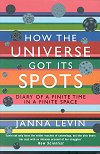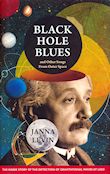This is a combined tutorial on the topology of the universe and a personal diary, cast as letters home to mother, explaining the work being done.
I found the cosmology fascinating: it starts off as a fairly standard coverage of relativity and the geometry of the universe, but about half way through it gets on to new stuff about the topology (connectedness) of the universe, in contrast to its geometry (curvedness). Levin explains how a flat or negatively curved universe can nevertheless be finite, with a suitable choice of topology, and the observational consequesnces of this.
The diary part I found rather less satisfactory. A junior to mid-career academic constantly moves from post to post: this diary shows the unhappy effect on personal relationships. But the detail is either too much, distracting from the science, or not enough, failing to show when, why, and how these changes occur. (This is not helped by a confusing part in the middle when Levin admits the dates are mixed up, leading to a feeling she is living two parallel lives at one point.) Additionally, this particular approach -- personal private live interwoven with impersonal cosmological descriptions -- misses out her personal scientific life: apart from a description of a conference or two, there is nothing on the day-to-day life in science. She must really enjoy the work, to let it affect her personal life so much, yet I didn't get a feel for the passion.

